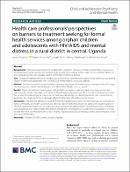| dc.contributor.author | Mugisha, James | |
| dc.contributor.author | Kinyanda, Eugene | |
| dc.contributor.author | Osafo, Joseph | |
| dc.contributor.author | Nalukeng, Winfred | |
| dc.contributor.author | Knizek, Birthe Loa | |
| dc.date.accessioned | 2022-02-23T11:23:41Z | |
| dc.date.available | 2022-02-23T11:23:41Z | |
| dc.date.issued | 2020-06-03 | |
| dc.identifier.citation | Mugisha, James...et al (2020). Health care professionals’ perspectives on barriers to treatment seeking for formal health services among orphan children and adolescents with HIV/AIDS and mental distress in a rural district in central, Uganda.Springer Link: Child and Adolescent Psychiatry and Mental Health.https://doi.org/10.1186/s13034-020-00332-8. | en_US |
| dc.identifier.uri | https://doi.org/10.1186/s13034-020-00332-8 | |
| dc.identifier.uri | https://kyuspace.kyu.ac.ug/xmlui/handle/20.500.12504/677 | |
| dc.description | 10 p. | en_US |
| dc.description.abstract | Little/no research has been conducted in Uganda in particular and sub-Saharan Africa in general on the health professional’s perspectives on barriers to treatment seeking for formal health services among orphan children and adolescents with a double burden of HIV/AIDS and mental distress.
Aim
To explore health professionals’ perspectives on barriers to treatment seeking for formal health services among orphan children and adolescents with HIV/AIDS and mental distress in Masaka, Uganda.
Method
Qualitative research design using key informant interviews with health service managers and staff in agencies working with children and adolescents with HIV/AIDS in Masaka district, Uganda.
Results
Barriers to treatment seeking reported by health care professionals were quite enormous and are summarized under: family, individual, community and health systems level barriers. The crosscutting finding here is that the societal informal and formal systems of care had been affected by the HIV/AIDs epidemic, and, mental distress aggravates this challenge for the individuals afflicted and families affected by mental distress.
Conclusion
Children and adolescents with both HIV/AIDS and mental distress are vulnerable due to constraints at family, community and health systems levels. Effective public health interventions to address the double burden of HIV/AIDS and mental distress will be vital in the study communities addressing the constraints at family, community and institutional level. Public health interventions should aim at increased access and effective utilization of services for both HIV/AIDS and mental health services. Stigma reduction strategies at individual, family and community levels are also recommended. | en_US |
| dc.language.iso | en | en_US |
| dc.publisher | Springer Link: Child and Adolescent Psychiatry and Mental Health | en_US |
| dc.subject | Children | en_US |
| dc.subject | HIV/AIDS | en_US |
| dc.subject | Mental distress | en_US |
| dc.subject | Uganda | en_US |
| dc.title | Health care professionals’ perspectives on barriers to treatment seeking for formal health services among orphan children and adolescents with HIV/AIDS and mental distress in a rural district in central, Uganda | en_US |
| dc.type | Article | en_US |

